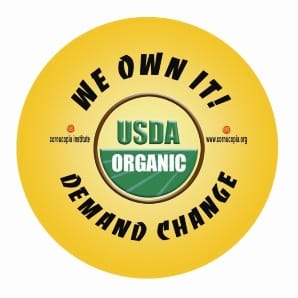FOR IMMEDIATE RELEASE
Contact: Mark Kastel, 608-625-2042
Will Fantle, 715-839-7731
Organic Governance Undermined by
Cozy Relationship with Agribusiness Lobbyists
One of the nation’s preeminent organic industry watchdogs, The Cornucopia Institute, expressed renewed criticism of the process used for the selection of four new appointees to the USDA’s National Organic Standards Board (NOSB). The NOSB is a 15-member volunteer board composed of various organic stakeholders that makes decisions regarding any synthetic materials allowed for use in organic agriculture and food production and also advises the USDA Secretary on policy.
 “The selection process was conducted in secrecy despite requests to cast sunlight on the decision making and solicit input from a very engaged community of organic farmers, businesses, and consumers,” said Will Fantle, Cornucopia’s Codirector. “We think a more transparent process would ensure the selection of the best and brightest for the various vacancies on the board — instead of, once again, appeasing the organic corporate lobby.”
“The selection process was conducted in secrecy despite requests to cast sunlight on the decision making and solicit input from a very engaged community of organic farmers, businesses, and consumers,” said Will Fantle, Cornucopia’s Codirector. “We think a more transparent process would ensure the selection of the best and brightest for the various vacancies on the board — instead of, once again, appeasing the organic corporate lobby.”
Cornucopia has been critical of past appointments that were more representative of the agribusiness sector than meeting requirements detailed in the federal law that created the board, the Organic Foods Production Act (OFPA). As powerful food processing interests have increasingly sought to add synthetic and non-organic materials to foods, the NOSB has become a focal point of controversy over what some deem a watering down of organic integrity.
Under both the Bush and Obama administrations the USDA has violated OFPA by appointing agribusiness executives, instead of those “owning or operating” a certified organic farm, to sit in seats intended to represent farmers. Currently, two of the four “farmers” on the board were employees of large agribusinesses when appointed.
“Congress deliberately set aside the majority of seats for independent organic stakeholders as a way to prevent the kind of unseemly corporate influence we have witnessed in recent years on the NOSB,” Fantle lamented.
 The new farmer-appointee, Ashley Swaffer, is an employee of Arkansas Egg Company, a large industrial-scale, vertically-integrated producer of eggs based in Summers, Arkansas.
The new farmer-appointee, Ashley Swaffer, is an employee of Arkansas Egg Company, a large industrial-scale, vertically-integrated producer of eggs based in Summers, Arkansas.
“Although Ms. Swaffer may technically meet the qualification set forth by Congress, in that she is involved in managing Arkansas Egg’s operation, I doubt if Congress had in mind stacking the board with agribusinesses historically operating ‘factory farms’ as representing the nation’s organic producers,” Fantle added.
When learning she had been passed over for an appointment to the NOSB, Wisconsin dairy farmer Rebecca Goodman said, “I am a hands-on organic dairy farmer working with my animals and land every day. I guess I am not suave enough to serve my fellow organic farmers. After three attempts, I will not be applying again.”
At least four other experienced, family-scale farmers had applied for the vacancy on the board in addition to Ms. Goodman.
A seat reserved for an organic “handler” manufacturer was filled by Tom Chapman, a purchasing manager with Clif Bar in Emeryville, California.
Unlike the appointment to the farmer seat, which Cornucopia challenged, the farm policy research group articulated disappointment in the appointment of an employee of Clif Bar, a company that sells a minimal amount of their product line as certified organic.
“The USDA Secretary could have chosen a representative of a company that sells 100% organic products, rather than a company that offers manufacturers less than 20% of their product line in a certified organic form,” stated Mark A. Kastel, Senior Farm Policy Analyst for The Cornucopia Institute.
The balance of Clif Bar’s other products either do not qualify for any organic labeling or are labeled “made with organic ingredients.”
Many companies in the natural foods marketplace can qualify for “made with organic” labeling by choosing organic for the majority of their cheaper ingredients (such as oats in a food bar) while sourcing more expensive ingredients in conventional form or adding synthetic materials that would not be allowed in products labeled certified organic.
In addition to conventional ingredients many Clif Bar products contain synthetic and non-organic materials such as soy protein isolate and milk protein concentrate (MPCs).
“Maybe it’s a general conflict of interest to have companies that are primarily involved in non–certified organic manufacturing, sitting on the National Organic Standards Board,” Kastel added. “Clif Bar’s product line is basically competing with companies, at a higher price point, that are truly organic. If they are using lots of ingredients that are not presently approved for organics, will they be predisposed to open up organic production for increased use of synthetics?”
In addition to Chapman and Swaffer, USDA Secretary Tom Vilsack also appointed Lisa de Lima, of Grandville, Maryland, with MOM’s Organic Market, to fill the retailer seat. The Secretary appointed Paula Daniels, a Los Angeles lawyer who sits on a number of public panels, to serve in the environmentalist/conservationist slot.
Both Fantle and Kastel emphasized that their current concerns and disappointments are aimed at the USDA Secretary and the appointment process rather than the individual appointees.
“We look forward to working with all these individuals, and unless proven otherwise, we will assume, that their motivation to serve on the board is in the interest of all,” said Kastel. “We will support their volunteer efforts, just as we have supported all board members, with research materials enabling them to make good judgment calls on behalf of the organic community.”
-30-
MORE:
“I have been waiting to hear from the NOP [National Organic Program] at the USDA about their next selections for the NOSB since September 1,” said Rebecca Goodman, a Wonewoc, Wisconsin, dairy farmer. “I never dreamed that I would hear through The Cornucopia Institute.”
In 2008 and 2009, while converting their 800,000-bird operation to organic production, Arkansas Egg was the subject of enforcement actions by the Arkansas Department of Environmental Quality and the U.S. Environmental Protection Agency (EPA). Last year they signed a consent decree with the state of Arkansas and the EPA related to remediating problems concerning manure and liquid waste.
If there is a common thread in the new appointments it is the Organic Trade Association (OTA), the industry’s business lobby. Three of the four appointees work for operations that are OTA members.
“For a volunteer board, the work of the NOSB is quite demanding, consuming 8-12 hours a week, and much more during the twice yearly full meetings of the board,” observed Fantle. “We respect anyone who wants to take on this responsibility. It is our hope that the new appointees will rise above any biases in their backgrounds and work in good faith for the entirety of the organic community and organic food and agriculture.”
Cornucopia recently released a scorecard of the voting records of NOSB members. The analysis seeks to capture voting patterns over the past five years that encourage or weaken organic integrity, and it notes distinct tendencies from various stakeholder interests. It illustrated a decisive split between legitimate farmers, representatives of nonprofit organizations, and other independent stakeholders, as opposed to members of the NOSB representing corporate agribusiness. It can be found at: https://www.cornucopia.org/nosb-scorecard/.

